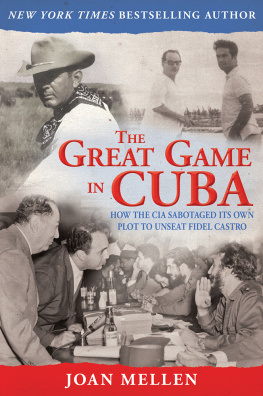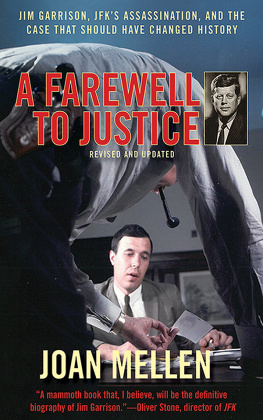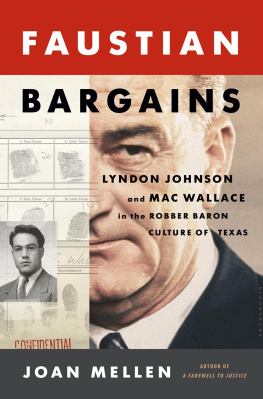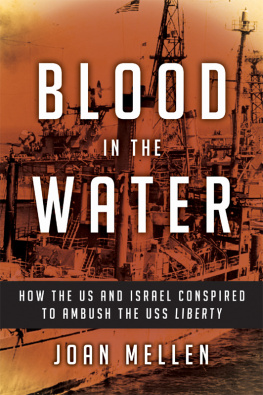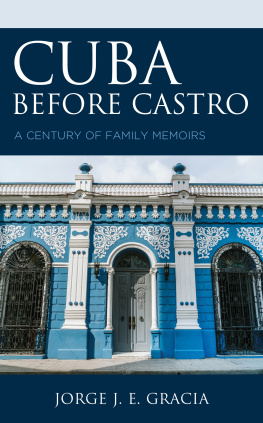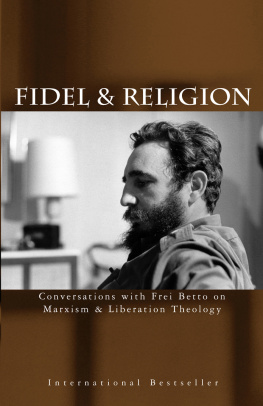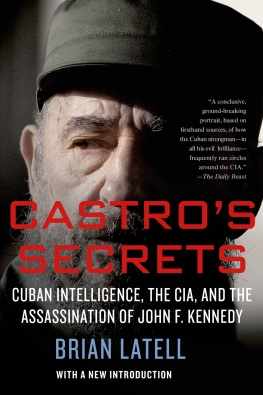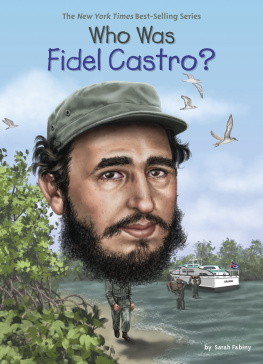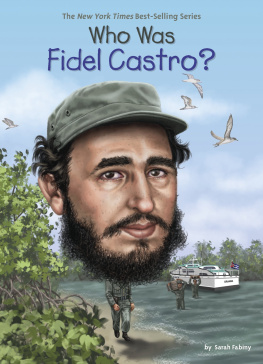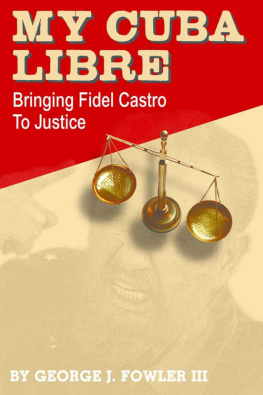The Great Game
in Cuba
Also by Joan Mellen
Our Man in Haiti: George de Mohrenschildt and the CIA in the Nightmare Republic
A Farewell to Justice: Jim Garrison, JFKs Assassination, and the Case
That Should Have Changed History
Jim Garrison: His Life and Times, The Early Years
Hellman and Hammett; The Legendary Passion of Lillian Hellman and
Dashiell Hammett
Kay Boyle: Author of Herself
Modern Times
In the Realm of the Senses
Seven Samurai
Literary Masterpieces: One Hundred Years of Solitude
Literary Masters: Gabriel Garca Mrquez
Literary Topics: Magic Realism
Bob Knight: His Own Man
Natural Tendencies: A Novel
Privilege: The Enigma of Sasha Bruce
ed. The World of Luis Buuel
Big Bad Wolves: Masculinity in the American Film
The Waves at Genjis Door: Japan Through Its Cinema
Women and Their Sexuality in the New Film
Marilyn Monroe
Filmguide to the Battle of Algiers
Copyright 2013 by Joan Mellen
All Rights Reserved. No part of this book may be reproduced in any manner without the express written consent of the publisher, except in the case of brief excerpts in critical reviews or articles. All inquiries should be addressed to Skyhorse Publishing, 307 West 36th Street, 11th Floor, Nw York, NY 10018.
Skyhorse Publishing books may be purchased in bulk at special discounts for sales promotion, corporate gifts, fund-raising, or educational purposes. Special editions can also be created to specifications. For details, contact the Special Sales Department, Skyhorse Publishing, 307 West 36th Street, 11th Floor, New York, NY 10018 or info@skyhorsepublishing.com.
Skyhorse and Skyhorse Publishing are registered trademarks of Skyhorse Publishing, Inc. , a Delaware corporation.
www.skyhorsepublishing.com
10 9 8 7 6 5 4 3 2 1
Mellen, Joan.
The great game in Cuba : how the CIA sabotaged its own plot to unseat Fidel Castro /
by Joan Mellen.
pages cm
ISBN 978-1-62087-467-7 (hardcover : alk. paper) 1. United States-Relations-Cuba. 2. Cuba-Relations-United States. 3. United States-Foreign relations-1961-1963. 4. United States. Central Intelligence Agency-History-20th century. 5. espionage, American-Cuba. 6. Subversive activities-Cuba-History-20th century. 7. Castro, Fidel, 1926-Assassination attempts. I. Title.
E183.8.C9M387 2013
327.7307291-dc23
2012043698
Printed in the United States of America.
For Malcolm Blunt
TABLE OF CONTENTS
A NOTE ON AN unusual usage: CIA is referred to throughout this text without the definite article the. This stylistic choice is in keeping with the Agencys own practice in referring to itself, both in written and spoken form. No one with more than a passing acquaintance with CIA is likely to affix the definite article the before CIA.
ACKNOWLEDGMENTS
T HE GREAT GAME IN CUBA is a work of historical exploration. The sources are either government documents or personal interviews that I conducted. That I was able to document CIAs history in Cuba was largely owing to Congress passing the JFK Assassination Records Collection Act of 1992. Under this mandate, several intelligence agencies were compelled to release tens of thousands of documents, many bearing no relation to the assassination of President Kennedy.
I owe a debt of gratitude to Malcolm Blunt, a connoisseur of documents who shared with me generously the fruits of his research. I cant think of anyone with a more profound acquaintance with the collections at the National Archives or with a stronger understanding of the U.S. intelligence community. It was from Malcolm Blunt that I first heard the names Czarnikow-Rionda, Robert J. Kleberg, Jr. (RJK), and Michael J. P. Malone.
I am deeply grateful as well to Ralph Schoenman for his support, suggestions, and encouragement throughout the years of this project. His extraordinary generosity knows no parallel.
It has been difficult to penetrate the inner workings of the Central Intelligence Agency because the Agency has so guarded its history. That includes shredding documents and creating others out of whole cloth for the record. After Allen Dulles death in 1969, his filing cabinets fell into the hands of former DD/P Richard Helms. Only a fraction of these files is available in the Dulles collection at the Selwyn Mudd Library at Princeton University.
CIA invaded other collections as well. George A. Braga, who presided over the Czarnikow-Rionda sugar brokerage, willed his personal papers to the University of Florida at Gainesville. Bragas papers had not yet been transferred to the library when two men in suits, as Bragas widow described them, arrived at her door. Believing they had been sent by the University of Florida, Mrs. Braga let them in. Soon they had walked off with five boxes of papers.
Oh, youre back! Mrs. Braga said when Carl Van Ness, curator of the University of Floridas Special Collections, arrived. When Van Ness examined the collection, he discovered that the personal letters and correspondence between Braga and Robert J. Kleberg, Jr., his partner at Becerra, King Ranch in Cuba, had vanished. Van Ness and Bragas son are convinced that the men in suits had been sent by CIA.
Other collections have also been sanitized. Holland McCombs, who worked as Klebergs speechwriter and was the researcher for Tom Leas biography of King Ranch, deposited his papers at the University of Tennessee at Martin. McCombs told a librarian there that he had himself been with CIA. When two FBI men arrived at the library to look over the McCombs papers, identifying themselves to curator Richard Saunders, they left empty-handed. McCombs had been scrupulous in sanitizing his own papers.
The Bruce-Lovett Report, a 1956 scathing assessment of CIAs clandestine services commissioned by President Eisenhower, was nowhere to be found. No copy resides at the National Archives. Nor can the Bruce-Lovett Report be found either among the papers of President Eisenhower or its authors, Ambassador David K. E. Bruce and Robert Lovett. Despite his being a government insider, Mr. Bruce was no apologist for the malfeasances of the clandestine services. He should be among the heroes of any historical study of CIA.
For helping me to unravel the double game CIA played with respect to Cuba, I am deeply grateful to Alberto Fernndez de Hechavarra, who shared his life story with me, speaking on the record for the first time. Alberto described the trajectory of his relationship with CIA, one that reveals the Agencys actual motives in involving itself in Cuban operations. I am grateful as well to Albertos sister Gladys Smithies, a shrewd observer of Cuban history, and to his wife, Josfina Garcia, and to his nephews Eduardo Snchez Rionda and John Smithies.
Dionisio Pastrana, who worked with Alberto Fernndez in those years, shared with me his unique experiences in Cuba. I would also like to thank Gustavo de los Reyes for recounting his life story as well as his relationship with Robert J. Kleberg, Jr., and with CIA. Don Carlson deserves special thanks for his assistance.
I would also like especially to thank Gordon Winslow for introducing me to the Cuban community in Miami, to Jorge Navarro Custn, and to the late Gaeton Fonzi, who generously offered me access to his files.
Others who contributed to this narrative include Billie Sol Estes and his daughter Pamela Estes Padgett; John Quirk and Congressman Ron Paul, along with his assistants Tracee Tolett and Jennifer Bailey.
Jim Lesar was always available to lend his gracious assistance. I am grateful as well to John Barbour; Tim Bowden; Lou Wolf; Dick Russell; Larry Hancock; Rex Bradford; the late Gaeton Fonzi; Burton Hersh; John Simkin; Greg Wagner; Barry Ford; Ed Sherry; Jim Hougan; John Tarver; Nathaniel Heidenheimer; Professor James Cypher; Edward Rynearson; Anne Gentry; Jim Johnson; Ed Tatro; John Loftus; Peter Lemkin; and Dawn Meredith.

